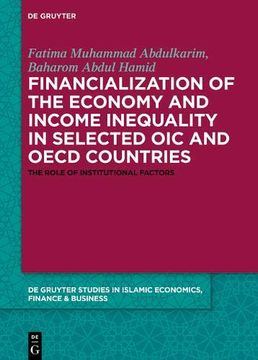Share
Financialization of the Economy and Income Inequality in Selected oic and Oecd Countries: The Role of Institutional Factors (de Gruyter Studies in Islamic Economics, Finance and Business) (in English)
Fatima Muhammad Abdulkarim; Abbas Mirakhor; Baharom Abdul Hamid (Author)
·
De Gruyter Oldenbourg
· Hardcover
Financialization of the Economy and Income Inequality in Selected oic and Oecd Countries: The Role of Institutional Factors (de Gruyter Studies in Islamic Economics, Finance and Business) (in English) - Fatima Muhammad Abdulkarim; Abbas Mirakhor; Baharom Abdul Hamid
Choose the list to add your product or create one New List
✓ Product added successfully to the Wishlist.
Go to My WishlistsIt will be shipped from our warehouse between
Tuesday, June 11 and
Wednesday, June 12.
You will receive it anywhere in United States between 1 and 3 business days after shipment.
Synopsis "Financialization of the Economy and Income Inequality in Selected oic and Oecd Countries: The Role of Institutional Factors (de Gruyter Studies in Islamic Economics, Finance and Business) (in English)"
Income inequality is a serious problem confronting not only the developed world but also developing countries. Recently, financialization has been one of the culprits identified in literature as one of the cause of income inequality. This book offers the only detailed presentation of the how financialization aided the spread of income inequality in Organization of Islamic Cooperation, OIC countries. Finance has taking a center stage in the affairs of most developing economies, surpassing the real sector of the economy. The result is the creation of an indebted society in which people are comfortable with financing their financial needs through credit. This creates a debt laden society that is trapped in the cycle of debt. This book represents a comprehensive and indispensable source for students, practitioners and the general public at large. It presents data which shows the buildup of debt and the rising income inequality in Muslim countries. It includes discussion of the rise in rentier income, financialization of everyday life, decline in physical capital accumulation and deregulation of the financial sector. The book therefore, proffers solutions on how Muslim countries can come out of the present economic problem facing them. The promotion and adoption of Islamic principles, which promotes risk sharing based contracts as against debt based transaction is the way to go. When financial contracts are based on the principles of risk sharing, any gains from economic activities get to be shared equitably. Hence, not only capital owners get to enjoy the benefit from the income derived from investments, but rather, all parties that partake in the contract. Distinguished by its clarity and readability as it is written in a very easy to understand language, it is an important reference work for any concerned individual interested on the recent causes of income inequality in Muslim World.

